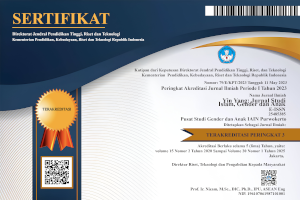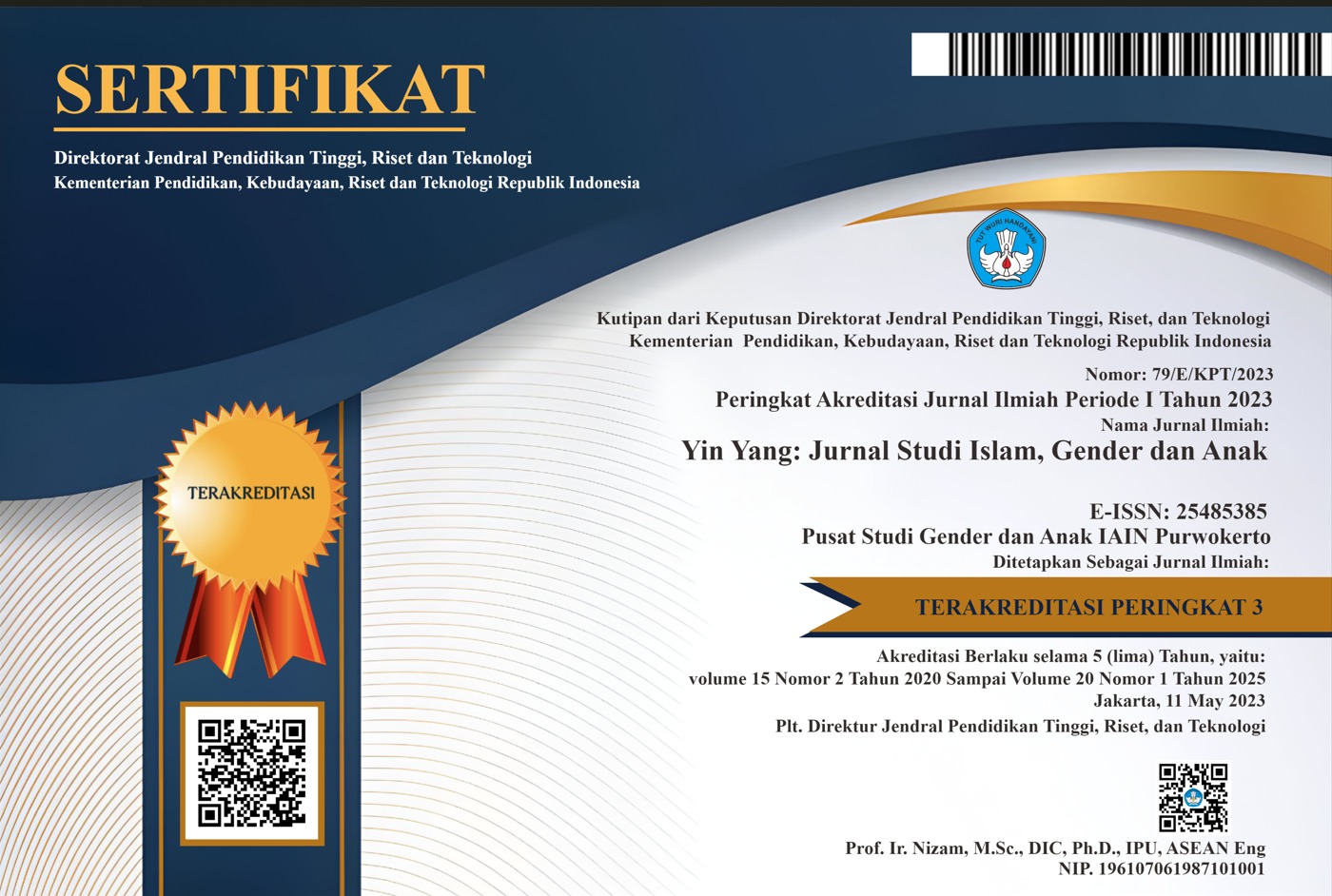Strategi pemberdayaan berbasis vocational skill pada perempuan miskin di perbatasan Entikong (Indonesia-Malaysia)
DOI:
https://doi.org/10.24090/yinyang.v15i1.3229Keywords:
Women's poverty, Border Community, Empowerment, Vocational SkillsAbstract
This Paper describes the poverty of women at the border of Entikong. The reality of poverty in rural women (border areas) today is still in severe situations. There has been no significance of the welfare development of the community, that in fact there are still many poor women's lives in the country boundary region. It is concluded that the community development program on the border is still loaded with interest and is vulnerable to being politicized by the elites, as a result the development of society is not up to the target. Method of research uses the feminist ethnographic approach as a stand point that research about women comes from a female's own perspective. The data collection techniques are observations, in-depth interviews, documentation studies, and live-in with the community to obtain precise and accurate information. The poverty of women on the border is due to women's limited access to resources. Then, on this paper the empowerment-based vocational skills become a strategic bid in the poverty-alleviation of women at the border.Downloads
Download data is not yet available.
References
Agusta, I. (2014). Diskursus, Kekuasaan, dan Praktik Kemiskinan di Pedesaan. Jakarta: Pustaka Obor Indonesia.
Anonim. Kawasan Perbatasan Entikong: Perjalanan Panjang Menuju Beranda Depan. Buletin Tata Ruang edisi Mei-Juni 2009.
Anonim. Rumusan Rekomendasi Kebijakan Pengelolaan Perbatasan di Kalimantan Barat. Jakarta: Kemitraan Bagi Pembaruan Tata Pemerintahan.
Booth, D., Hanmer, L., & Elizabeth, L. (2000). Poverty and Transport: A Report Prepared for the World Bank in Collaboration with DFID. London: the Overseas Developmentn Institute.
Chamber, R. (1997). Poverty and Livelihoods: Whose Reality Count? Environment and Urbanization. 7(1): 173-204. https://doi.org/10.1177/095624789500700106
Dharmawan, A. H. (2007). Sistem Penghidupan dan Nafkah Pedesaan: Pandangan Sosiologi Nafkah (Livehood Sociology) Mazhab Barat dan Mazhab Bogor. Jurnal Sodality. 1: 169-192. Doi: https://doi.org/10.22500/sodality.vli2.5932
Diwakar, V., & Shepherd, A. (2018). Understanding Povery in Kenya: A Mutididimensional Analysis. London: the Overseas Development Institute.
Gradin, C. (2015). Rural Poverty and Ethnicity in China. Measurement of Poverty, Deprivation, and Economic Mobility Research on Economic Inequality. 23: 221-247. Doi: https://doi.org/10.1108/S1049-258520150000023007
Huruswati, I., Dkk. (2012). Evaluasi Program Pembangunan Kesejahteraan Sosial di Desa Perbatasan Kalimantan Barat. Jakarta: P3KS Press.
Jato, M. N. (2004). Gender-Responsive Programming for Poverty Reduction. Technical Paper. Ethiopia: UNFA Technical Service Team.
Khan, A. R., & Khandaker, S. (2016). A Critical Insight into Policy Implementation and Implementation Performance. Public Policy and Administration. 15(4): 538-548. Doi: https://doi.org/10.13165/VPA-16-15-4-02
McNamara, P. (2015). Feminist Ethnography: Storytelling that Makes a Difference. Qualitative Social Work. 8(2): 161-177. Doi: https://dx.doi.org/10.1177/1473325009103373
Nadim, S. J., & Nurlukman, A. D. (2017). The Impact of Women Empowerment on Poverty Reduction in Rural Area of Bangladesh: Focusing on Village Development Program. Journal of Government and Civil Society. 1(2): 135-157. Doi: http://dx.doi.org/10.31000/jgcs.v1i2.444
Niko, N. (2017). Fenomena Trafficking in Person di Wilayah Perbatasan Kalimantan Barat. Raheema: Jurnal Studi Gender dan Anak. 4(1): 32-37.
Niko, N. (2019). Kemiskinan Perempuan Dayak Benawan di Kalimantan Barat sebagai Bentuk Kolonialisme Baru. Jurnal Pemikiran Sosiologi. 6(1): 58-76. Doi: https://doi.org/10.22146/jps.v6i1.47467 \
Oum, S. (2019). Energy Poverty in the Lao PDR and its Impact on Education and Health. Energy Policy. 132: 247-253. Doi: 10.1016/j.enpol.2019.05.030
Peraturan Presiden Republik Indonesia Nomor 166 Tahun 2014 Tentang Program Percepatan Penanggulangan Kemiskinan
Proefschrift. (1974). Understanding How Actors Influence Policy Implementation. Universiteit Twente.
Ritzer, G. (2012). Teori Sosiologi Modern (terj. Alimandan). Jakarta: Kencana Prana Media Group.
Sasono, A. (1987). Masalah Kemiskinan dan Fatalisme. Jakarta: UI-Press.
Schrock, R. D. (2013). The Methodological Imperatives of Feminist Ethnography. Journal of Feminist Scholarship. 5(5): 48-60. Retrieved from: https://digitalcommons.uri.edu/jfs/vol5/iss5/5
Shiva, V. (1997). Bebas dari Pembangunan: Perempuan, Ekologi dan Perjuangan Hidup di India. Jakarta: Yayasan Obor Indonesia.
Small, M. L., & Newman, K. (2001). Urban Poverty after the Trully Disadvantaged: The Rediscovery of the Family, the Neighborhood, and Culture. Annual Reviews Sociology. 27: 23-45. Doi: 10.1146/annurev.soc.27.1.23
Subekti, S. (Ed.). (2013). Diakonia Transformatif: Bukan di Gereja-gereja, Tetapi di Masyarakat. Berita Satu Harapan. Retrieved from: http://www.satuharapan.com/read-detail/read/diakonia-transformatif-bukan-di-gereja-gereja-tetapi-di-masyarakat
Suharto, E. (2009). Kemiskinan dan Perlindungan Sosial di Indonesia. Bandung: ALFABETA.
Tika, F. Y. A., Hanafi, I. & Riyanto. (2017). Implementasi Kebijakan Pemberdayaan Masyarakat (Studi pada Pelaksanaan Program Nasional Pemberdayaan Masyarakat (PNPM) Mandiri Perkotaan di Kecamatan Batu Kota Batu). Jurnal Administrasi Publik (JAP). 1(2): 188-196.
Undang-Undang No. 32 tahun 2004 tentang Pemerintahan Daerah
Undang-Undang No. 43 tahun 2008 tentang Wilayah Negara
Undang-Undang No. 12 tahun 2008 tentang Kesejahteraan Sosial
Wahyudin. (2012). Pelatihan Kewirausahaan Berbasis Ekokultural untuk Pemberdayaan Masyarakat Miskin Pedesaan. Jurnal Mimbar. 28(1): 55–64. Doi: https://doi.org/10.29313/mimbar.v28i1.339
World Bank. (2015). Rwanda Poverty: Assesment Poverty Global Practice Africa Region. World Bank Group.
Wright, R. E. (1996). Standardized Poverty Measurement. Journal of Economic Studies. 23(4): 3-17. Doi: https://doi.org/10.1108/01443589610149889
Anonim. Kawasan Perbatasan Entikong: Perjalanan Panjang Menuju Beranda Depan. Buletin Tata Ruang edisi Mei-Juni 2009.
Anonim. Rumusan Rekomendasi Kebijakan Pengelolaan Perbatasan di Kalimantan Barat. Jakarta: Kemitraan Bagi Pembaruan Tata Pemerintahan.
Booth, D., Hanmer, L., & Elizabeth, L. (2000). Poverty and Transport: A Report Prepared for the World Bank in Collaboration with DFID. London: the Overseas Developmentn Institute.
Chamber, R. (1997). Poverty and Livelihoods: Whose Reality Count? Environment and Urbanization. 7(1): 173-204. https://doi.org/10.1177/095624789500700106
Dharmawan, A. H. (2007). Sistem Penghidupan dan Nafkah Pedesaan: Pandangan Sosiologi Nafkah (Livehood Sociology) Mazhab Barat dan Mazhab Bogor. Jurnal Sodality. 1: 169-192. Doi: https://doi.org/10.22500/sodality.vli2.5932
Diwakar, V., & Shepherd, A. (2018). Understanding Povery in Kenya: A Mutididimensional Analysis. London: the Overseas Development Institute.
Gradin, C. (2015). Rural Poverty and Ethnicity in China. Measurement of Poverty, Deprivation, and Economic Mobility Research on Economic Inequality. 23: 221-247. Doi: https://doi.org/10.1108/S1049-258520150000023007
Huruswati, I., Dkk. (2012). Evaluasi Program Pembangunan Kesejahteraan Sosial di Desa Perbatasan Kalimantan Barat. Jakarta: P3KS Press.
Jato, M. N. (2004). Gender-Responsive Programming for Poverty Reduction. Technical Paper. Ethiopia: UNFA Technical Service Team.
Khan, A. R., & Khandaker, S. (2016). A Critical Insight into Policy Implementation and Implementation Performance. Public Policy and Administration. 15(4): 538-548. Doi: https://doi.org/10.13165/VPA-16-15-4-02
McNamara, P. (2015). Feminist Ethnography: Storytelling that Makes a Difference. Qualitative Social Work. 8(2): 161-177. Doi: https://dx.doi.org/10.1177/1473325009103373
Nadim, S. J., & Nurlukman, A. D. (2017). The Impact of Women Empowerment on Poverty Reduction in Rural Area of Bangladesh: Focusing on Village Development Program. Journal of Government and Civil Society. 1(2): 135-157. Doi: http://dx.doi.org/10.31000/jgcs.v1i2.444
Niko, N. (2017). Fenomena Trafficking in Person di Wilayah Perbatasan Kalimantan Barat. Raheema: Jurnal Studi Gender dan Anak. 4(1): 32-37.
Niko, N. (2019). Kemiskinan Perempuan Dayak Benawan di Kalimantan Barat sebagai Bentuk Kolonialisme Baru. Jurnal Pemikiran Sosiologi. 6(1): 58-76. Doi: https://doi.org/10.22146/jps.v6i1.47467 \
Oum, S. (2019). Energy Poverty in the Lao PDR and its Impact on Education and Health. Energy Policy. 132: 247-253. Doi: 10.1016/j.enpol.2019.05.030
Peraturan Presiden Republik Indonesia Nomor 166 Tahun 2014 Tentang Program Percepatan Penanggulangan Kemiskinan
Proefschrift. (1974). Understanding How Actors Influence Policy Implementation. Universiteit Twente.
Ritzer, G. (2012). Teori Sosiologi Modern (terj. Alimandan). Jakarta: Kencana Prana Media Group.
Sasono, A. (1987). Masalah Kemiskinan dan Fatalisme. Jakarta: UI-Press.
Schrock, R. D. (2013). The Methodological Imperatives of Feminist Ethnography. Journal of Feminist Scholarship. 5(5): 48-60. Retrieved from: https://digitalcommons.uri.edu/jfs/vol5/iss5/5
Shiva, V. (1997). Bebas dari Pembangunan: Perempuan, Ekologi dan Perjuangan Hidup di India. Jakarta: Yayasan Obor Indonesia.
Small, M. L., & Newman, K. (2001). Urban Poverty after the Trully Disadvantaged: The Rediscovery of the Family, the Neighborhood, and Culture. Annual Reviews Sociology. 27: 23-45. Doi: 10.1146/annurev.soc.27.1.23
Subekti, S. (Ed.). (2013). Diakonia Transformatif: Bukan di Gereja-gereja, Tetapi di Masyarakat. Berita Satu Harapan. Retrieved from: http://www.satuharapan.com/read-detail/read/diakonia-transformatif-bukan-di-gereja-gereja-tetapi-di-masyarakat
Suharto, E. (2009). Kemiskinan dan Perlindungan Sosial di Indonesia. Bandung: ALFABETA.
Tika, F. Y. A., Hanafi, I. & Riyanto. (2017). Implementasi Kebijakan Pemberdayaan Masyarakat (Studi pada Pelaksanaan Program Nasional Pemberdayaan Masyarakat (PNPM) Mandiri Perkotaan di Kecamatan Batu Kota Batu). Jurnal Administrasi Publik (JAP). 1(2): 188-196.
Undang-Undang No. 32 tahun 2004 tentang Pemerintahan Daerah
Undang-Undang No. 43 tahun 2008 tentang Wilayah Negara
Undang-Undang No. 12 tahun 2008 tentang Kesejahteraan Sosial
Wahyudin. (2012). Pelatihan Kewirausahaan Berbasis Ekokultural untuk Pemberdayaan Masyarakat Miskin Pedesaan. Jurnal Mimbar. 28(1): 55–64. Doi: https://doi.org/10.29313/mimbar.v28i1.339
World Bank. (2015). Rwanda Poverty: Assesment Poverty Global Practice Africa Region. World Bank Group.
Wright, R. E. (1996). Standardized Poverty Measurement. Journal of Economic Studies. 23(4): 3-17. Doi: https://doi.org/10.1108/01443589610149889
Downloads
Published
2020-05-13
How to Cite
Niko, N. (2020). Strategi pemberdayaan berbasis vocational skill pada perempuan miskin di perbatasan Entikong (Indonesia-Malaysia). Yinyang: Jurnal Studi Islam Gender Dan Anak, 15(1), 1–18. https://doi.org/10.24090/yinyang.v15i1.3229
Issue
Section
Articles
License
Authors who publish with this journal agree to the following terms: Authors retain copyright and grant the journal right of first publication with the work simultaneously licensed under a Creative Commons Attribution-ShareAlike 4.0 International License that allows others to share the work with an acknowledgment of the work's authorship and initial publication in this journal.


















